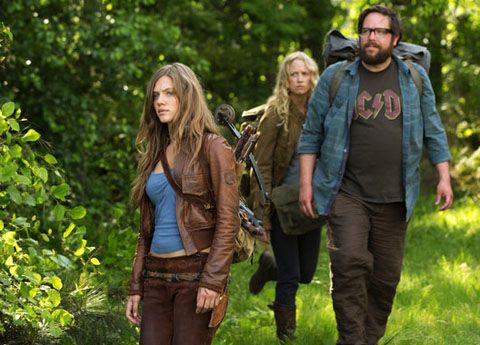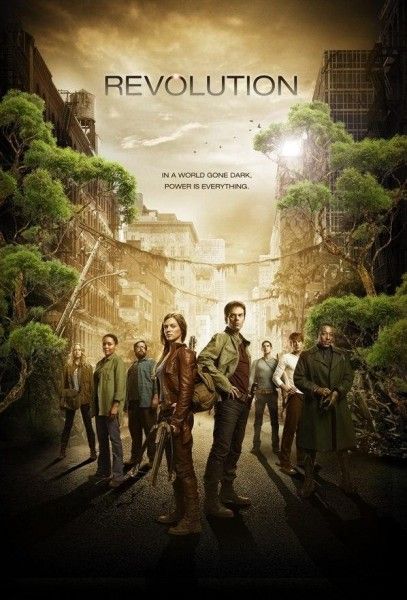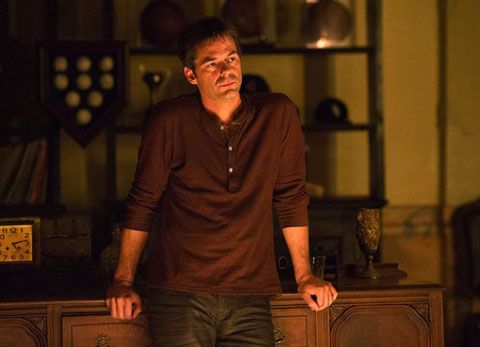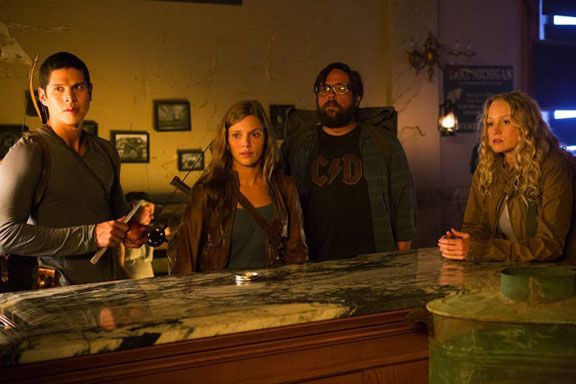The NBC drama series Revolution, premiering on September 17th, tells the story of a family that struggles to reunite in an American landscape where every single piece of technology — computers, planes, cars, phones and even lights — has mysteriously blacked out forever. The show is centered around one strong-willed young woman, Charlie Matheson (Tracy Spiridakos), whose brother is kidnapped by militia leaders, forcing her to reconnect with her estranged uncle (Billy Burke), in order to rescue Danny (Graham Rogers), overthrow the militia and ultimately re-establish the United States of America, all while they explore the enduring mystery of why the power failed and if it will ever return.
During this recent exclusive interview with Collider, show creator/writer/executive producer Eric Kripke (Supernatural) talked about how the idea for the show started, how both J.J. Abrams (as executive producer) and Jon Favreau (as the pilot’s director) got involved, wanting to tell a character-driven adventure tale, how Revolution will have a slightly different and less snarky tone than Supernatural, his decision to immediately address the fact that the lack of electricity is not quite what it initially seems, the challenges of going from doing a show with two main characters to doing a show with a large ensemble cast, and how he already has a really solid idea about what Season 2 is, as well as possible notions for Season 3. Check out what he had to say after the jump.
Collider: When you do a show that’s so complex, with the concept and all these possible stories and characters, was there one thing that it started with?
ERIC KRIPKE: There was, as a matter of fact. When I am kicking around show ideas, or really any idea, usually an image comes to me. I don’t really start with a character or a logline like, “What if the electricity turned off?” I was just noodling on an idea from an image of two guys having a sword fight, Lord of the Rings style, but instead of some kind of English Stonehenge, vine-covered structure as their backdrop, they were doing it in front of a vine-covered Starbucks. It was honestly that. And then, I started thinking, “Can we make America into a feudal kingdom, where we can have adventures and heroes and villains and love and loyalty?” It was just about coming up with a setting where you could tell a really classic, epic, sweeping adventure saga that was a very Joseph Campbell type of Star Wars and Lord of the Rings world.
I wanted to tell an old story that was about a journey, the way that Star Wars is the same story as The Lord of the Rings, which is the same story as The Wizard of Oz, which is the same story as The Odyssey. There’s one great story, and it’s big and it’s sweeping and it’s epic and it’s complicated. I wanted to tell that story, using the advantage of the medium of series television. The disadvantage that Star Wars and The Lord of the Rings had, as much as I’m a slave to those movies, is that they don’t have 22 hours a season, hopefully, to tell that story and to really flesh out every facet of their world. I thought this would be a great opportunity to use the television medium to really be able to dive, neck deep, into that type of story. So, it started with that. Honestly, it was about coming up with some version of, “Okay, how do transform the American landscape into a setting where you can have adventure and excitement?”
So, how did you then get involved with Bad Robot?
KRIPKE: Bad Robot and I had been wanting to do something together for awhile. I said, “I’ve got this idea for after the fall of society, and dudes with swords and heroes, and there’s this farm girl who sets off on this adventure.” They said, “Great! What caused society to fall?” And I said, “I don’t know. Maybe a plague?” And they said, “Well, you know, we’re working on this story about what happens if there was a blackout. We wanted to tell a story in the initial aftermath of that, but we’re having trouble because that’s a really depressing show.” And I said, “Well, your chocolate is going to meet my peanut butter, my friends.” So, we took both ideas and, from that, Revolution was born.
What then brought Jon Favreau in, as the third piece of the puzzle?
KRIPKE: After the script was written and J.J. [Abrams] and I had gone through the development process with NBC, and they had greenlit us to pilot, we started meeting with directors. Jon [Favreau] came in and sat down. It’s crazy to me that Jon Favreau had to have a meeting with me. I want to make that very clear. But, he came in and sat down and said, “I get what you’re doing.” I said, “What do you mean?” And he said, “This isn’t a post-apocalyptic story that you’re doing. You’re doing Game of Thrones. You’re doing The Lord of the Rings. I get it. You can’t fool me!” And I just was like, “You’ve got the job! You know what we’re setting out to do here,” which is this rollicking character-driven adventure tale. He understood the subtext of it immediately, and he really understood the Joseph Campbell myth of it, just from reading it. And then, on top of that, he is just one of the best in the business at making genre feel real, but making it feel fun, too.
Because it was so important to us that this not be a harrowing, depressing world, but instead be an exciting, romantic world that everyone wants to visit, every week, and have it be funny and swash-buckling and exciting and daring, and all that stuff, Jon is one of the best at that and I knew he would bring that tone to the piece. I’m just a fan of those guys, and they’re both still amazingly involved. There are moments when J.J. Abrams and Jon Favreau will be coming into the writers’ room of the show that I created and I’m watching them bat ideas around and, man, their batting average on great ideas is scary good. They’re just so smart, and I have to pretend to be a showrunner and cool and be like, “Oh, that’s very interesting, let’s talk about that,” when secretly all I want to do is bust out my phone and start taking pictures. I’m a fan, just like the viewers are.
Show creators typically tend to be stay fairly anonymous, compared to the actors on their shows, but because you already have a following from the success of Supernatural, people are interested in this show largely due to your involvement. Is that a weird position to be in?
KRIPKE: I try not to think about it. I’m very flattered and honored, and I have such affection for the Supernatural fans. They are some of the smartest, most dedicated fans of television, period. I believe, in my heart, that they will love this show, and I hope they give it a chance and tune in. But, my serious answer is that, if anything, I find it inspiring because the fact that there are people out there who believe, for some mistaken reason, that I’m able to maintain a standard of television quality, it makes you want to meet and exceed those standards, and it makes you want to go, “I’m not going to put crap out there. I’m going to put out something that I believe in, or I’m not going to do it.” I’m really scared of putting out a product that people will say, “Oh, that’s not as good as the other thing.” I want them to say, “Oh, that’s as good as the other thing,” or “That’s better than the other thing,” or “Man, he’s got a really cool take on genre.” If anything, it pushes me to really want to make it as great as it can possibly be.
Two things that Supernatural is known for is its sense of humor and its music. Will this show have a similar sense of humor, and how will you be dealing with music on a show about a world with no electricity?
KRIPKE: Fans of Supernatural will be happy to know that, in the first three minutes of the pilot, there’s two dudes in a muscle car, playing AC/DC. It wasn’t until I was even on set, shooting it, that Jon turned to me and was like, “This looks a lot like your other show,” and I said, “My god, you’re right! What is it about me that wants two protagonists in a muscle car, jamming to AC/DC? What is it about my tone?” I like to think that it’s got a lot of the same heart and a lot of the same intense focus on character. What separates Revolution from a lot of the genre shows that have failed before us is that they were far too interested in the concept and the shiny new toy of their mystery, and they forgot that what it’s about is characters struggling to be good and find their way home. Supernatural and Revolution both have that in common.
People pitch me the crazy mystery, mind-blowing thing, all the time. My response is, “Great, but how do the characters feel about it, and how do we reveal new facets and new dimensions of who they are?” If there’s a similarity with Supernatural, it’s that the genre elements take a backseat to really delving into the humanity of these complicated, realistic characters that I want people to fall in love with. I think the humor is there, but it’s a slightly different tone. It’s a little less snarky. It’s hard to make a lot of pop culture references where there’s no pop culture. Not to say that the older characters can’t make references, and they do, but the younger characters just don’t have that shared history of television where they can make those references. But, there’s a sweeter, character-based humor to it that I think is pretty effective. In terms of how I get my classic rock in, there’s always acoustic numbers.
You’ve stated that not everything is quite what it seems, when it comes to there not being any electricity. Had you always wanted to immediately address that, by the end of the pilot, or had you thought about putting that off for awhile?
KRIPKE: That was always in there. There was a healthy debate about how long we should withhold that information. That character was always a part of the story and the mythology, and then it became a question of, “Do you run into her in Episode 5, or do you run into her in the pilot?,” and we just decided to do it right away. We want to hook people early and let people know of the breadth and potential of the world. It’s no secret that the show is about people who want to turn the power back on, so the idea that there’s these isolated pockets of people who might still have it is just a beacon of hope on the horizon, and maybe they can find those people, and maybe they can interact and enlist them.
The other thing that I think is really interesting, in terms of how it fleshes out the world of the show, is that because we take the electricity away, it puts so many rules back on the show and on the storytelling. You can’t call for help, you can’t hop in a car, and you can’t run away from the bad guys. You do that so that you get that palpable gasp when a woman busts out a Commodore 64 and you go, “Oh, my god, she’s got a dot matrix printer!” It reminds people of the wonder of what these things are that we so take for granted. It was a beautiful moment for me, when they had that reaction and that they so didn’t take for granted that there was just the most simple, basic piece of technology. It was helpful, in that way too, because it really forces the audience to really start to look at technology in a different way.
What are the challenging of going from two main characters to a large ensemble cast?
KRIPKE: I have had to learn to adapt, and I’m keeping a lot more plates spinning. I’m really keeping track of what everyone’s story is, but it’s also a gift. When were in the writers’ room on Revolution, in the first week of the show, we had an A story that the main characters were doing and I said, “Oh, yeah, but we really need to cut to something here. What are we going to cut to?” Someone said, “How about the four other stories that you’re doing?!” It was a revelation. I was so excited. I was like, “You’re right, I can cut to other things!” On Supernatural, I couldn’t cut away. I just had to find a way to keep their story going. So, for me, to jump around into these different stories has been a really fun sandbox to play in.
How far ahead have you planned things out, so that you don’t write yourself into a corner that you can’t get out of?
KRIPKE: I’m crazy anal about mythology. I’m almost famous for it. In the writers’ room, people pitch me a reveal and I’m like, “Well, explain that. Why did that happen? What’s the secret behind that?” And if they don’t know it, then I don’t buy it. For me, I like to know where the season is going. I have it mapped out. I know what the answers are because I don’t like making it up, as I go. I like being able to plant in little clues, so that whenever we get to it, people know that they’re in the hands of a storyteller who’s telling a story with at least a certain amount of confidence. I don’t want to make it up, as I go. I don’t think that’s fair to the audience. If they’re going to make an investment in hearing a story, the storyteller should know what the ending is. So, I like to map out where the season goes. That’s not to say that there aren’t a few twists and turns or surprises, along the way. I don’t like to map out every single instance. I like to be surprised. But, I definitely like to know where it’s going. I know what Season 1 is. I have a really solid idea about what Season 2 is, and I’m starting to think about notions for Season 3, knock on wood. So, tune in and help me get to it, people!
Revolution airs on Monday nights on NBC, starting September 17th.




